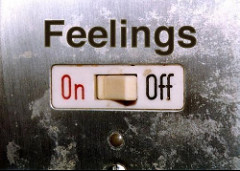Getting in touch with our feelings can be a good thing. As long as we don’t always trust them.
Overall, self-awareness is a useful trait to develop, and paying attention to our emotions can be helpful. But, our feeling can sometimes lead us in the wrong direction.
Our job is to become aware of our feelings, examine them, and try to understand where they are coming from. Then, it’s up to us to choose what to do with them.

Can We Trust Our Feelings?
Are feelings helpful? They may be. Sometimes, they could even be prompted by God. But, too often, they simply cannot be trusted.
I took a quick self-test to see how well I could trust my feelings, and I realized:
Sometimes, I do not feel like getting going on that tough task, spending time on spiritual matters, counting my blessings, being kind in how I speak, helping someone who needs it, admitting when I am wrong, apologizing when I screw up … (and the list goes on and on).
And, too often, I do feel like trying to control things more than I should, being lazy, getting my own way, worrying, becoming angry … (I’ll stop here before this list gets too long).
We can’t trust feelings. They are not facts, nor are they truth. Sometimes, they are dangerous.
Feelings are a source of input to our conscious mind, something we should pay attention to. But, it’s our responsibility to do the next right thing, no matter what our emotions may be.
Can We Control Our Emotions?
 We can learn to get better at harnessing our emotions, but only to a degree.
We can learn to get better at harnessing our emotions, but only to a degree.
In life, we cannot control other people or circumstances, although we often try. But, we can control our choices. In this spectrum of control, feelings and emotions seem to fit in between, and they may haunt us more than we realize.
A feeling is an emotional state or reaction that is often vague and irrational, and emotions are simply strong feeling. Neither are cognitive (from the reasoning of our mind) or volitional (a choice we make). They arise spontaneously rather than through logic or by conscious choice
Our choices are more cognitive. They come from the process of perceiving, judging, and reasoning.
And choices are volitional, a deliberate act of our will (whether we realize it at the time or not). We can control our choices, and we can choose what we will do with our feelings and emotions.
Getting in Touch With Our Feelings
Can we learn to get better at trusting our feelings? And controlling our emotions? Yes, we can.
“Cultivating an awareness of your feelings is crucial. Emotional security can best be described as the ability to identify, label and express what you’re feeling. In other words, you know how to address your emotions in a healthy way.” (“10 Signs You’re In Touch With Your Emotions” by Lindsay Holmes in The Huffington Post)
The article referenced above goes on to say that as we grow in emotional security, we can:
- Become more honest with ourselves.
- See the bigger picture of what is going on.
- Deal with our feelings in a healthy manner.
- Handle the negatives that happen in our lives.
- Become more empathetic with other people.
- Learn when to ask for help.
The world of recovery teaches us well in this regard, with two specific steps we can choose to take:
- Make a searching and fearless moral inventory of ourselves.
- Humbly ask God to remove all our shortcomings.
And we can decide that these steps will be part of a personal moral inventory we take each day.
God will help us in this process. Over time, he can change us–literally, not figuratively–so that more of our feelings and emotions become good ones. As we grow with God over time, we will feel more like doing more right things more of the time.
And we can all use some more of that.
Question: What feelings do you have that you should not trust?
Action: Make the choice to conduct a personal inventory each day.
Photo by GanMed64  Photo by cykocurt
Photo by cykocurt  Photo by .• Daniel Pham .•
Photo by .• Daniel Pham .• 
